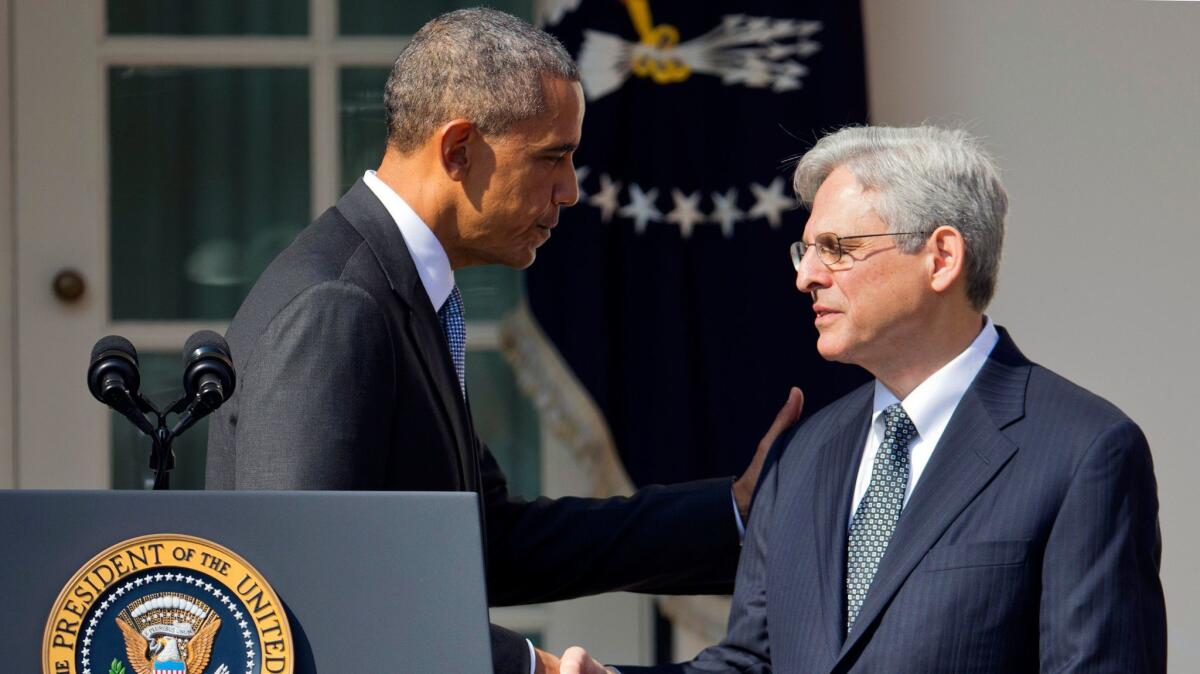Editorial: Confirm Merrick Garland, and end the partisan pettiness over the Supreme Court

Now that the U.S. Senate is back in session, it should hold hearings on and — barring the unlikely emergence of some disqualifying information — approve President Obama’s nomination of Judge Merrick Garland for a vacancy on the U.S. Supreme Court.
We know what you’re thinking. Even before Obama nominated Garland in March to succeed the late Antonin Scalia, Senate Republicans said they would refuse to consider any Obama nominee. They invoked the supposed custom — which they fabricated from whole cloth — that the Senate doesn’t act on Supreme Court nominations in a presidential election year.
“The American people should have a voice in the selection of their next Supreme Court justice,” Senate Majority Leader Mitch McConnell said after Scalia died. “Therefore, this vacancy should not be filled until we have a new president.”
When it looked as if Hillary Clinton would be elected, some Republican senators declared themselves unwilling to confirm anyone she would name to the court.
Now that Donald J. Trump has won enough states to claim an electoral college majority (even though most voters favored someone else), it’s almost certain that McConnell and his colleagues will sit tight, congratulate themselves on their cleverness and wait for Trump to be sworn in and submit the name of a more conservative nominee. But by playing out that scenario, McConnell will achieve a short-term political gain at the cost of long-term damage to the court and to the traditions of bipartisan comity to which he often has paid homage.
In recent years, members of both parties in the Senate have undermined one of those traditions: the notion that the president is entitled to significant deference in choosing members of the court, so long as the nominees are professionally well-qualified, free of scandal, possessed of a judicial temperament (which includes a respect for precedent) and within the broad mainstream of legal thinking. But the Republicans’ decision to stonewall Garland’s nomination carried this politicization to scandalous extremes.
Even when presidents choose well qualified nominees who are relatively moderate — such as Chief Justice John G. Roberts Jr., a George W. Bush appointee, or Justice Elena Kagan, named by Obama — significant numbers of senators of the opposite party vote no. Worse than that, when it looked as if Hillary Clinton would be elected, some Republican senators declared themselves unwilling to confirm anyone she would name to the court.
This sort of knee-jerk opposition is bad for the Senate and bad for the court. Yes, justices appointed by Democratic presidents generally vote in certain kinds of cases differently than Republican appointees. Yes, candidates campaign for the presidency on the basis of the kinds of justices they will appoint to the court, and for some voters that is an important issue.
But judges aren’t legislators, nor are they pawns of the parties of the presidents who appoint them. (Roberts twice voted to uphold the Affordable Care Act, President Obama’s signature legislative achievement, against legal challenges — prompting Trump to complain that “Justice Roberts really let us down.”) The fact that justices serve for life means that they often rule on issues that did not have a political or partisan coloration at the time they were confirmed.
Senators have every right to question nominees about their views about the Constitution and their approach to judging, and to vote against those they consider truly outside the mainstream. But to reflexively reject — or refuse even to consider — a sitting president’s nominee because he or she is from the “wrong” party is a recipe for perpetual gridlock.
That brings us back to the Garland nomination. In protesting the Republicans’ stonewalling of Obama’s nominee, Senate Democrats argued — correctly — that it’s unfair to the court to deprive it of a ninth member who could break deadlocks on key legal questions. But if Garland’s nomination is allowed to die, Democrats might change their minds — and understandably so — next year when President Trump seeks to bring the court up to full strength. Under Senate rules, it is still possible for the minority to filibuster a Supreme Court nomination.
And even if Republicans took the extraordinary step of eliminating filibusters on Supreme Court nominees (as Democrats did for other presidential nominations when they controlled the Senate in 2013), there will come a time when a Republican president will need the support of a Democratic-controlled Senate to confirm his or her Supreme Court nominee.
When Obama nominated Garland, he warned the Senate that if it did not offer the judge a fair hearing “it will not only be an abdication of the Senate’s constitutional duty, it will indicate a process for nominating and confirming judges that is beyond repair.” It’s not too late to take those wise words to heart.
Follow the Opinion section on Twitter @latimesopinion and Facebook
ALSO
Under Trump, could Congress regain some of its long-lost power?
Obama’s diverse American majority was just an anomaly. Now what?
Latino voters rebuked Trump and the Republicans, but they weren’t wowed by the Democrats either
More to Read
A cure for the common opinion
Get thought-provoking perspectives with our weekly newsletter.
You may occasionally receive promotional content from the Los Angeles Times.










